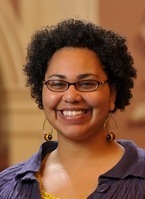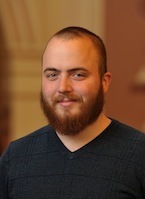

To some observers and critics, there is a stark divide between Notre Dame and the communities in the South Bend area. Two recent graduates of the Master of Fine Arts in Creative Writing Program worked diligently for their two-year tenure at Notre Dame to bridge those worlds, bringing Notre Dame into South Bend’s underprivileged communities, and poignantly likewise, those communities into Notre Dame.
Ryan Downey and Sami Schalk entered the MFA program in 2008, both specializing in poetry. While their original creative projects and styles are vastly different, their mutual interests in underserved communities, marginalization, gender and disability studies, and the temporal experiences of those people and places come together both in their creative work and in their work for the community. They aptly represent Notre Dame’s simultaneous emphasis on scholarship and stewardship.
Relations between the MFA program and South Bend’s Center for the Homeless (CFH) had been previously established under the guidance of Professor Valerie Sayers, but as MFA students, Schalk and Downey quickly stepped up to facilitate and organize weekly sessions. During those sessions, residents of the Center are given the outlet to write in a guided setting and the opportunity to share that writing with their peers. Even if only one or two residents show up on a weekly basis, the MFA-CFH relationship operates under the conviction that one person’s voice is important enough to garner the perpetuation of the workshop. For some residents, the workshop writing has become an act of catharsis and self-awareness. Theintensely personal, deeply felt, sometimes self-effacing product of these writings is evident in the culminating anthology Body of Words. Residents at CFH have been invited to Notre Dame to give readings of their work on campus.
Using the principles established at the CFH, Schalk and Downey revitalized a partnership between Notre Dame’s MFA program and the South Bend Juvenile Correctional Facility (JCF). Formerly a one-time event, this workshop now runs consistently. During sessions, inmates at the facility, young men between the ages of 12 and 18, are invited to write, read, and share their work with each other. The gutsiness and uniqueness of this program have garnered much attention, including a story by a local news team at WNDU.
Downey and Schalk’s work has given them the opportunity to share their experiences at various conferences, including the Association of Writers and Writing Programs (AWP) annual conference. There, they presented their paper, “Writing on the Margins: Community Outreach in Shelters and Correctional Facilities.”
In addition to their social justice work, both Schalk and Downey distinguished themselves separately in the course of their writing lives at Notre Dame. Schalk’s work employs a narrative lyric, with a focus on the idea of belonging and with a scope that ranges from personal relationships to racial or political position. In her writing, personal space intertwines with overtly global and ideological tensions through use of a straightforward diction and musicality. Downey is interested in language itself as a changing force, one that is almost a victim to history and experience. Themes of cartography and recording methodology play themselves out in his work through use of Southern diction and slang, pop culture, and truncated Spanish. Both students’ academic and creative courses at Notre Dame are encapsulated in their distinguished theses, Schalk’s A Physical Education and Downey’s Maw Maw.
Schalk is currently pursuing a Ph.D. in Gender Studies at Indiana University in Bloomington. Downey works as the poet-in-residence and instructor at the Poetry Center of Chicago, where he works with school-aged children. Happily, the program at the Juvenile Corrections Facility continues under the leadership of current second-year poet CJ Waterman. Though it was started as a poetry-only program, the JCF has recently expanded it to include both poetry and prose.